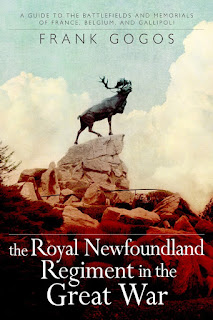The Royal Newfoundland Regiment in the Great War
Frank Gogos graduated from Memorial University in 1994 after
completing his education in history and Newfoundland studies. His latest effort
is The Royal Newfoundland Regiment in the
Great War. With more than 400 photographs and 40 maps, the work is a
tribute to those who served and a guide for those who wish to retrace the
soldiers’ steps. Recently we spoke with the author about the book.
What inspired you to become a writer?
I
guess it would have been my father. He passed away when I was four years old
but left behind scrapbooks of poems and short stories in both English and
Hungarian. It was his dream to be a writer. I guess I picked up on that and it
had become a dream of mine also.
Are they the same reasons you do it
today?
Not
really, I had always thought I would be a fiction writer and I have evolved
into a historian of sorts. My first two books were for entirely different
reasons than I ever imagined.
What are the challenges of the
profession?
The
biggest challenge is financial of course. The type of writing I do requires
travel for research, accommodations and a lot of free time which I can only
achieve through financial sacrifice. It is the cost of being a writer,
researcher - historian.
What are the rewards?
In
my case the satisfaction of expressing my passion for the subject to people
interested in Newfoundland and the Great War - as well as adding to the general
knowledge base of the subject.
How have you grown as a writer over time?
The
more I write the more polished it becomes. Practice makes perfect as they say. I
still have room for improvement and look forward to honing my writing skills on
my next project.
Is your creative process more
'inspirational' or 'perspirational'?
It
is part inspirational as I take cues from objects and stories but the finish is
pure perspirational. Writing and rewriting and rewriting again work up a lot of
blood, sweat and tears, late nights and binge eating!
What makes a good book?
Any
book that can engage a reader from beginning to the end makes a good book. In
the historical sense a good book should add to the knowledge base without being
cumbersome. It needs to be accessible to everyone not just the academia.
What motivated you to write this
particular book?
After
traveling overseas on my own personal pilgrimage to the Newfoundland War
Memorials and battlefields I began to be asked a lot of questions by friends
and acquaintances about where to go and what to do from people getting ready to
do their own pilgrimages leading up to the 100 Anniversary of the Newfoundland
Regiment’s near annihilation on July 1, 1916. I have been the guide for
intimate and large tour groups (and continue to do so) to the battlefields of
France, Belgium and Gallipoli for a few years now. It all just started to fit
together, my research, travels and photography and the timing was important
factor in the decision.
What did you learn during the process?
How
to stay calm! LOL
How did you feel when the book was
completed?
A
sense of relief! It had been a long process, not just in the writing portion
but in layout and design. Many meetings and adjustments were made right up to
the last minute.
What has the response been like so far
from those that have read it?
The
response has been overwhelmingly positive. Sales are brisk. I have received
feedback from people who bought the book, used it on their own pilgrimage and
went out of their way to compliment me on its usefulness and information that
it contains. Other researchers in the field were surprised and have commented
that they learned things from the history portion that they did not know.
What are your thoughts on the state of
Newfoundland literature today?
Newfoundland
literature today is booming. There are more books released every month in
Newfoundland and Labrador that run the gamut of genre than I think anywhere
else in Canada. At least it seems that way. Newfoundlanders were always known
for their storytelling and now it seems many have found a way to tap into that
through publishing.
What's next on your creative agenda?
I
have several more history books I wish to write regarding Newfoundland and the
Great War. Eventually I would like to finish my World War I book set with a
historical fiction from my family’s perspective.




